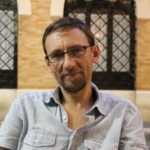Lien vers Pubmed [PMID] – 19136956
Nat. Struct. Mol. Biol. 2009 Feb;16(2):159-67
Several molecular mechanisms have been proposed to explain trinucleotide repeat expansions. Here we show that in yeast srs2Delta cells, CTG repeats undergo both expansions and contractions, and they show increased chromosomal fragility. Deletion of RAD52 or RAD51 suppresses these phenotypes, suggesting that recombination triggers trinucleotide repeat instability in srs2Delta cells. In sgs1Delta cells, CTG repeats undergo contractions and increased fragility by a mechanism partially dependent on RAD52 and RAD51. Analysis of replication intermediates revealed abundant joint molecules at the CTG repeats during S phase. These molecules migrate similarly to reversed replication forks, and their presence is dependent on SRS2 and SGS1 but not RAD51. Our results suggest that Srs2 promotes fork reversal in repetitive sequences, preventing repeat instability and fragility. In the absence of Srs2 or Sgs1, DNA damage accumulates and is processed by homologous recombination, triggering repeat rearrangements.


